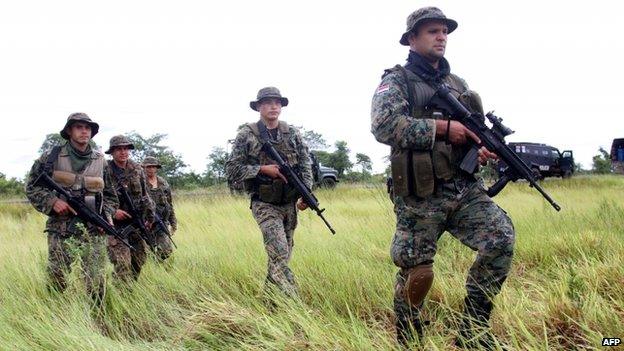German cattle ranchers killed by guerrillas in Paraguay
- Published

A military army patrol was sent out to hunt down the guerrillas after the deaths of the German ranchers
A German couple who had been farming in Paraguay for 30 years have been found shot dead at their ranch in the north of the country.
Roberto Natto and Erika Reiser, both in their 60s, had been kidnapped and shot several miles from their ranch.
Government officials say they were killed by a left-wing guerrilla group, the Paraguayan People's Army.
Their bodies are due to be repatriated to Germany as an investigation into the killings continues.
The couple had been held along with four ranch workers on their farm outside Yby Yau, around 395km (245 miles) from Paraguay's capital, Asuncion.
The workers had escaped but both Germans were killed.
A government investigator said police had found the bodies after a shoot-out with fighters they allege belonged to the guerrilla group.
The investigators said the guerrillas had been demanding money and food from local ranchers to be given to the poor as compensation for alleged deforestation.
Elusive
The Paraguayan People's Army (EPP) is estimated to number between 50 and 150 people.
It has been blamed for a series of killings in the last few years.
In May 2013 it was accused of killing Luis Lindstron, a former city mayor and owner of a logging operation.
Various political leaders have tried to eliminate the EPP.
In 2010, Fernando Lugo, who was president at the time, declared a state of emergency and sent 200 crack troops to find the rebels.
In 2011 the government tried again, this time sending about 3,000 troops and police.
Some arrests were made, but the group remained elusive.
Correspondents say the EPP appears to be changing its strategy, focussing less on kidnappings and more on attacking ranches and trying to extract payments from landowners.
Although little is known about them, the EPP appears to oppose industrialized agriculture, feeding off resentment in rural areas over the growth of large soybean farms, many of which are Brazilian-owned.
They also draw on, and sometimes coerce, support from poor farmers in areas where the public services are minimal.